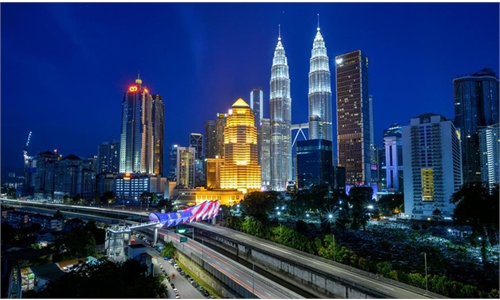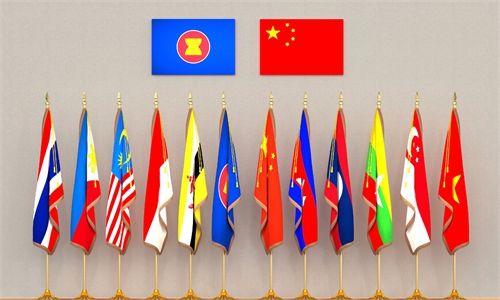Exclusive: Malaysia's PM visit to China 'historical'; BRI offers an opportunity to countries to make a choice: Malaysian official
Malaysian transport minister refutes 'debt trap' claims against BRI
The visit of Malaysia's Prime Minister Datuk Seri Anwar Ibrahim to China is historical and significant for future cooperation between Malaysia and China, Malaysian Transport Minister Anthony Loke Siew Fook told the Global Times in an exclusive interview on Saturday as Anwar's delegation wrapped up its China visit on the same day.
The senior Malaysian official also refuted claims about a "debt trap" allegedly caused by the China-proposed Belt and Road Initiative (BRI) projects, saying that the BRI offers an opportunity to developing countries to "make a choice."
"Malaysian PM Anwar's visit to China is historical and significant for Malaysia-China cooperation," Loke said, noting that Malaysia is expecting more cooperation under the BRI, especially on infrastructure.
We hope that such cooperation will become a win-win situation where there is more cooperation between Chinese and Malaysian companies in undertaking these projects, for example, more contributions from the Chinese companies toward technology transfers and the training of Malaysian engineers, Loke noted. "We are also looking at attracting some of these Chinese companies to set up their regional base in Malaysia," he said.
When Chinese President Xi Jinping met Anwar on Friday, he urged the two sides to coordinate and promote development and cooperation in various fields to further enhance bilateral ties, which will inject new momentum into the prosperity and development of the two countries and the entire region.
The two sides agreed to vigorously advance high-quality BRI cooperation, cultivate growth points for cooperation in the digital economy, green development, new energy and other areas, so as to bring more tangible benefits to the two countries and their people.
Some Western media recently claimed that the BRI projects have created heavy debt burdens for some countries, after China had spent $240 billion bailing out 22 developing countries from 2008 to 2021. With the amount increasing in recent years, those countries have struggled to repay the BRI loans.
"Whichever government or whichever country signs up to the BRI, they should know what they are signing up to. This cannot be seen or viewed as a 'debt trap,'" Loke said.
When they sign up to a BRI project, they should have analyzed the costs and benefits for their country, the Malaysian official said, stressing that infrastructure projects are important to developing countries as they can be a catalyst for growth.
Loke noted that the BRI is giving developing countries an opportunity to make a choice to boost their own economy, and countries should make good use of it and be responsible for their own choices.
Malaysia's East Coast Rail Link (ECRL) is a flagship BRI project in the country, which is expected to greatly enhance connectivity in the Southeast Asian country. "This project is progressing well right now, it's almost 40 percent completed and will be operational in 2027," Loke said, expressing his expectation that it will be completed on schedule.
During Anwar's trip, the possibilities of reviving another rail project - a high-speed railway project connecting Kuala Lumpur and Singapore - were also in focus.
There is a lot of interests in reviving the Kuala Lumpur to Singapore high-speed rail line, Loke said. He noted that Malaysian companies have spoken to him about their interests and about their intent. Some are looking forward to having a joint venture or cooperation with Chinese companies to implement those projects, Loke said.
"What we are looking at is that the private sector has to play an important role in this project. While we are supportive of this project, our condition is that this project must be built by the private sector, not by the government," he said.
The multibillion-dollar high-speed rail project was proposed in 2013, aiming to cover the 350-kilometer distance between Kuala Lumpur and Singapore in under 90 minutes.
Loke said there are ongoing discussions about the project, but nothing is finalized. "I'm aware that Malaysian private companies are talking to their counterparts from China," he said.
While the ECRL is expected to create thousands of local jobs, the Malaysian official said it is important that BRI projects become more localized in terms of workforce, procurement and the supply chain.
Loke said he also called on the Chinese government to contribute to the realization of the pan-Asia railway network, connecting China, Laos, Thailand, Malaysia and Singapore. While the railway network is already there in terms of infrastructure, it needs to be integrated in terms of regulations, policies and customs clearance to ensure freight can travel seamlessly between China and Southeast Asian countries.
"We hope that China can play a more active role in facilitating these exchanges between China and Southeast Asia," he said.
During his meeting with Anwar, Xi emphasized that China is ready to work with Malaysia to support the core position of ASEAN, rejecting the Cold War mentality and camp confrontation.
Given that the US has been ramping up efforts to pressure ASEAN members to take sides amid the US-China rivalry, Malaysia, as an ASEAN member, must remain a free, neutral and peaceful zone, the Malaysian official said. "We are committed to multilateral organizations and multilateral cooperation."
"Any cooperation and any bloc [group] that we are entering into should be for more integration in terms of economy. And we are committed to open trade with any country in the world," he said.



